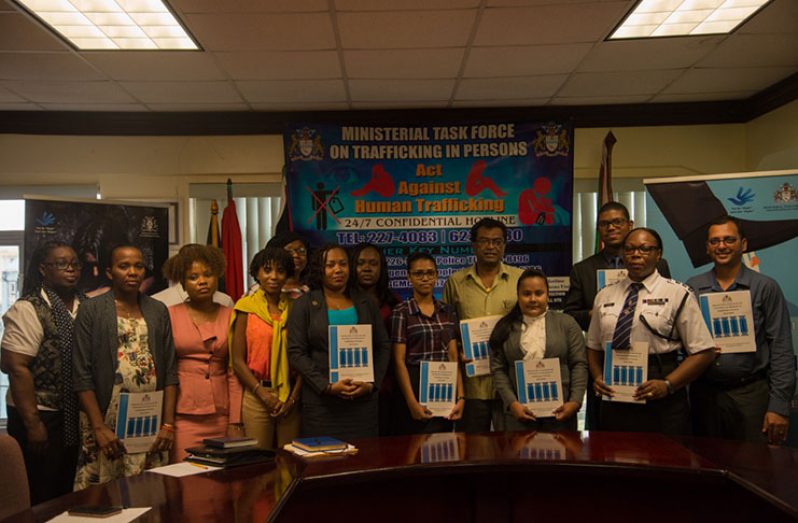BUILDING on the successes and looking to address limitations of the 2017–2018 Action Plan, the Ministerial Task Force on Trafficking in Persons on Wednesday launched a new plan 2019–2020 at the Ministry of Public Security (MoPS) office, Brickdam.
The MoPS is the lead agency on a list of 15 bodies which make up the task force, which is committed to seeing the reduction in the occurrence of TIP across the country. The Task Force also includes the involvement of the Ministry of Social Protection, Ministry of Communities, Ministry of Indigenous Peoples’ Affairs and the Director of Public Prosecution’s (DPP) Office.
The plan of action outlines the government’s planned initiatives, measures and activities to enhance the prevention of TIP, protection of victims and the prosecution of suspected offenders through partnership with stakeholders. The 2019–2020 Action Plan reports a success in tackling the scourge. “2017– 2018 marked a period of growth regarding Guyana’s institutional response to the crime,” the report noted.
The plan noted that while 2017 marked a decrease in TIP, 2018 saw an unprecedented increase. The increase was attributed to trafficking of foreign nationals, primarily females from Latin America. “Traffickers in 2018 proved to be opportunists, taking advantage of difficult situations experienced by these nationals in their home territories through sexual exploitation in Guyana,” the report stated.
The plan is crafted on six pillars: prevention, protection, reintegration, investigation, prosecution and partnership. “The best way to combat TIP is to institute effective measures to prevent occurrences of the crime. For such programmes to be effective they need to be tailored to the specific environment and climate of the area affected and should take into account external factors, including as many relevant stakeholders as possible,” the report noted.
The plan takes into consideration the recommendations contained in the United States’ State Department TIP Report on Guyana. Since the launching of the first action plan, in the State Departments 2017 TIP report, Guyana moved from being Tier two to Tier one, meaning the country fully met the minimum standards for combating trafficking in person.
Attending the launch was the Minister of Public Security, Khemraj Ramjattan; Acting Project Coordinator of the TIP Task Force, Oliver Profitt, and several representatives from the 15 TIP Task Force member agencies. Ramjattan outlined the importance of analysing the achievements of the previous Action Plan, and building on it. “Having implemented our previous action plan there were some key achievements. It is not going to be just proper for us to implement, it is also to do an assessment and evaluation of our successes,” Ramjattan noted.
“I am hoping that with this following plan we’re going to have more investigations, more charges and more convictions.” Ramjattan noted, while adding that there are limitations in the fight against TIP.
“We have to train more of our police officers, judicial officers, and frontline responders. That requires resources, but with the resources that we have, we are carrying through with the recommendations. The recommendations out of the US TIP report, include victim services outside the capital for males and children. We seemed bias to our women, so that is an important recommendation from our TIP report that we want to implement as far as possible. Another area that we will have to work hard on is to vindicate and meet the needs of victims while also preventing future victimisation. Meeting the needs of the victims calls for a lot of resources and of course we are not yet there. But with the oil and gas revenue stream we will get there soon and I’m rather optimistic we will realise the resources necessary,” he said.
Nonetheless, the minister noted that much has been accomplished thanks to the collaboration of the varying agencies.
“We cannot win the battle alone as a law enforcement agency, it never going to work. There’s going to be limitations in relations to law enforcement, but when we can have a variety of agencies locally and internationally, success will be at hand,” Ramjattan said.
“We achieved inter-agency collaboration for victims; collaboration with anti-trafficking partners, the Guyana Geology and Mines Commission, the Ministry of Indigenous Peoples’ Affairs and Indigenous Peoples’ Commission. There has been enhanced collaboration with the DPP’s office in providing even more and more increasingly, more legal support and we’re proud of that.”




.png)









